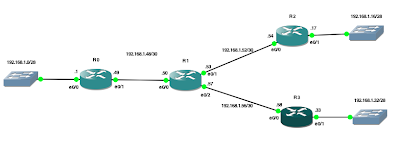I'll be using the diagram below for my network layout.

As Standard ACL's can only filter based on the source address they should be placed as near to the destination as possible. Standard access-lists can be numbered from 1-99 or 1300-1999 (expanded range). Standard access-lists can also be named. In this post I'll be using a numbered Standard ACL.
I begin by verifying connectivity before the rule is created.
R0
R0#ping r3
Type escape sequence to abort.
Sending 5, 100-byte ICMP Echos to 192.168.1.58, timeout is 2 seconds:
!!!!!
Success rate is 100 percent (5/5), round-trip min/avg/max = 4/8/16 ms
Next I create the standard access-list
R1
R1#conf t
Enter configuration commands, one per line. End with CNTL/Z.
R1(config)#ip access-list standard 1
R1(config-std-nacl)#deny host 192.168.1.49 log
R1(config-std-nacl)#permit any log
R1(config-std-nacl)#exit
I have enabled logging so I can see as each statement is hit. There is an implicit deny all statement so none is required in the access-list itself.
I place the access-list as near to the destination as possible. In this case it will be on e0/2 on R1, and it will be outgoing. Placing the list any nearer to R0 would affect traffic to R2.
R1(config)#int
R1(config)#interface ethernet 0/2
R1(config-if)#ip access-group 1 out
R1(config-if)#end
I can check the ACL with a show command.
R1#sh ip access-lists 1
Standard IP access list 1
10 deny 192.168.1.49 log (0 matches)
20 permit any log (0 matches)
I can also check which interface the rule is applied to.
R1#sh ip interface ethernet 0/2
Ethernet0/2 is up, line protocol is up
Internet address is 192.168.1.57/30
Broadcast address is 255.255.255.255
Address determined by non-volatile memory
MTU is 1500 bytes
Helper address is not set
Directed broadcast forwarding is disabled
Multicast reserved groups joined: 224.0.0.9
Outgoing access list is 1
Inbound access list is not set
Proxy ARP is enabled
Local Proxy ARP is disabled
Security level is default
Split horizon is enabled
ICMP redirects are always sent
ICMP unreachables are always sent
ICMP mask replies are never sent
IP fast switching is enabled
IP fast switching on the same interface is disabled
IP Flow switching is disabled
IP CEF switching is enabled
IP CEF Feature Fast switching turbo vector
IP multicast fast switching is enabled
IP multicast distributed fast switching is disabled
IP route-cache flags are Fast, CEF
Router Discovery is disabled
IP output packet accounting is disabled
IP access violation accounting is disabled
TCP/IP header compression is disabled
RTP/IP header compression is disabled
Policy routing is disabled
Network address translation is disabled
BGP Policy Mapping is disabled
WCCP Redirect outbound is disabled
WCCP Redirect inbound is disabled
WCCP Redirect exclude is disabled
From the output above I can see that the ACL is applied to the right interface in the right direction. Only one access-list can be applied per interface per direction.
Now I check my pings fail to reach R3 from R0
R0
R0#ping r3
Type escape sequence to abort.
Sending 5, 100-byte ICMP Echos to 192.168.1.58, timeout is 2 seconds:
U.U.U
Success rate is 0 percent (0/5)
Back on R1 I can see the deny statement has been hit.
R1
*Mar 1 00:33:33.783: %SEC-6-IPACCESSLOGNP: list 1 denied 0 192.168.1.49 -> 192.168.1.58, 1 packet
To verify that my traffic can still hit R2 I attempt to ping it from R0.
R0
R0#ping r2
Type escape sequence to abort.
Sending 5, 100-byte ICMP Echos to 192.168.1.54, timeout is 2 seconds:
!!!!!
Success rate is 100 percent (5/5), round-trip min/avg/max = 4/12/24 ms
R2
I can also check that traffic from R2 can reach R3.
R2#ping r3
Type escape sequence to abort.
Sending 5, 100-byte ICMP Echos to 192.168.1.58, timeout is 2 seconds:
!!!!!
Success rate is 100 percent (5/5), round-trip min/avg/max = 8/8/12 ms
R1
This can be seen hitting the permit statement in the access-list.
*Mar 1 00:42:00.419: %SEC-6-IPACCESSLOGNP: list 1 permitted 0 192.168.1.54 -> 192.168.1.58, 1 packet
Checking the access-list again I can see a number of hits.
R1#sh ip access-lists 1
Standard IP access list 1
10 deny 192.168.1.49 log (5 matches)
20 permit any log (5 matches)
As R3 is receiving its route updates from R1 it will still know about R0 and how to find it.
R3
R3#sh ip route
Codes: C - connected, S - static, R - RIP, M - mobile, B - BGP
D - EIGRP, EX - EIGRP external, O - OSPF, IA - OSPF inter area
N1 - OSPF NSSA external type 1, N2 - OSPF NSSA external type 2
E1 - OSPF external type 1, E2 - OSPF external type 2
i - IS-IS, su - IS-IS summary, L1 - IS-IS level-1, L2 - IS-IS level-2
ia - IS-IS inter area, * - candidate default, U - per-user static route
o - ODR, P - periodic downloaded static route
Gateway of last resort is not set
192.168.1.0/24 is variably subnetted, 6 subnets, 2 masks
C 192.168.1.32/28 is directly connected, Ethernet0/1
C 192.168.1.56/30 is directly connected, Ethernet0/0
R 192.168.1.48/30 [120/1] via 192.168.1.57, 00:00:15, Ethernet0/0
R 192.168.1.52/30 [120/1] via 192.168.1.57, 00:00:15, Ethernet0/0
R 192.168.1.0/28 [120/2] via 192.168.1.57, 00:00:15, Ethernet0/0
R 192.168.1.16/28 [120/2] via 192.168.1.57, 00:00:15, Ethernet0/0
However, R3 cannot recieving ping responses from R0 because the echo replies will be blocked by the access-list.
R3#ping r0
Type escape sequence to abort.
Sending 5, 100-byte ICMP Echos to 192.168.1.49, timeout is 2 seconds:
.....
Success rate is 0 percent (0/5)
Using a debug command on R0 I can see the pings hit the router but they cannot get back.
R0
R0#debug ip icmp
ICMP packet debugging is on
R0#
*Mar 1 00:56:11.823: ICMP: echo reply sent, src 192.168.1.49, dst 192.168.1.58
*Mar 1 00:56:11.835: ICMP: dst (192.168.1.49) administratively prohibited unreachable rcv from 192.168.1.50
I finish up by removing the ACL from the interface and the router.
R1
R1(config)#interface ethernet 0/2
R1(config-if)#no ip access-group 1 out
R1(config-if)#exit
R1(config)#no access-list 1
R1(config)#end
